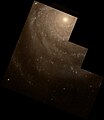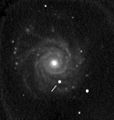NGC 3938: Difference between revisions
Ted Griffin (talk | contribs) ce |
m Task 18 (cosmetic): eval 7 templates: hyphenate params (6×); |
||
| Line 7: | Line 7: | ||
|epoch =2000 |
|epoch =2000 |
||
|type =SA(s)c |
|type =SA(s)c |
||
|ra ={{RA|11|52|42.9}}<ref name=kopernik>{{cite web |url=http://www.kopernik.org/images/archive/n3938.htm |title=Spiral Galaxy NGC 3839 |author=George Normandin |date=5 May 2005 |publisher=kopernik.org | |
|ra ={{RA|11|52|42.9}}<ref name=kopernik>{{cite web |url=http://www.kopernik.org/images/archive/n3938.htm |title=Spiral Galaxy NGC 3839 |author=George Normandin |date=5 May 2005 |publisher=kopernik.org |access-date=30 December 2011}}</ref> |
||
|dec ={{DEC|+44|07|17}}<ref name=kopernik/> |
|dec ={{DEC|+44|07|17}}<ref name=kopernik/> |
||
|dist_ly = 43 Million [[light year]]s |
|dist_ly = 43 Million [[light year]]s |
||
| Line 16: | Line 16: | ||
|names = |
|names = |
||
}} |
}} |
||
'''NGC 3938''' is an [[unbarred spiral galaxy]] in the [[Ursa Major]] constellation. It was discovered on 6 February 1788 by [[William Herschel]]. It is one of the brightest spiral galaxies in the Ursa Major South galaxy group and is roughly 67,000 [[light years]] in diameter.<ref name=aotu>{{cite web |url=http://www.atlasoftheuniverse.com/galgrps/uma.html |title=The Ursa Major Groups |publisher=Atlas of the Universe | |
'''NGC 3938''' is an [[unbarred spiral galaxy]] in the [[Ursa Major]] constellation. It was discovered on 6 February 1788 by [[William Herschel]]. It is one of the brightest spiral galaxies in the Ursa Major South galaxy group and is roughly 67,000 [[light years]] in diameter.<ref name=aotu>{{cite web |url=http://www.atlasoftheuniverse.com/galgrps/uma.html |title=The Ursa Major Groups |publisher=Atlas of the Universe |access-date= 30 December 2011}}</ref> It is approximately 43 million light years away from [[Earth]].<ref name=kopernik/> NGC 3938 is classified as type Sc under the [[Hubble sequence]], a loosely wound spiral galaxy with a smaller and dimmer bulge.<ref name="Kruit">{{cite journal | last1 = van der Kruit | first1 = P.C. | last2 = Shostak | first2 = G.S. | title = Studies of Nearly Face-on Spiral Galaxies| journal = Astronomy and Astrophysics| volume = 105| pages = 351–358| date = 1982| url = http://articles.adsabs.harvard.edu/cgi-bin/nph-iarticle_query?1982A%26A...105..351V&data_type=PDF_HIGH&whole_paper=YES&type=PRINTER&filetype=.pdf| bibcode = 1982A&A...105..351V | access-date = 25 June 2014 }}</ref> The spiral arms of the galaxy contain many areas of [[H II region|ionized atomic hydrogen]] gas, more so towards the center.<ref>{{cite journal | last = Jiménez-Vicente| first = J.|display-authors=4 |author2=E. Battaner |author3=M. Rozas |author4=H. Castañeda |author5=C. Porcel | title = Fabry-Perot observations of the ionized gas in NGC 3938| journal = Astronomy and Astrophysics| volume = 342| pages = 417–425| date = 1999| url = http://articles.adsabs.harvard.edu/cgi-bin/nph-iarticle_query?1999A%26A...342..417J&data_type=PDF_HIGH&whole_paper=YES&type=PRINTER&filetype=.pdf| bibcode = 1999A&A...342..417J|arxiv = astro-ph/9811391 }}</ref> |
||
== Supernovae == |
== Supernovae == |
||
Two [[supernova]]e have been identified within NGC 3938. [[SN 2005ay]] is a [[Type II Supernova|type II supernova]] that was discovered on 27 March 2005 and had a magnitude of 15.6.<ref>{{cite web|title=Supernova 2005ay in NGC 3938|url=http://www.rochesterastronomy.org/sn2005/sn2005ay.html|work=Rochester Astronomy| |
Two [[supernova]]e have been identified within NGC 3938. [[SN 2005ay]] is a [[Type II Supernova|type II supernova]] that was discovered on 27 March 2005 and had a magnitude of 15.6.<ref>{{cite web|title=Supernova 2005ay in NGC 3938|url=http://www.rochesterastronomy.org/sn2005/sn2005ay.html|work=Rochester Astronomy|access-date=29 January 2013}}</ref> SN 2017ein is a [[Type Ib and Ic supernovae|type Ic supernova]] that was discovered on 25 May 2017 and peaked at magnitude 14.9.<ref>{{cite web|title=Supernovae 2017ein in NGC 3938|url=http://www.rochesterastronomy.org/sn2017/sn2017ein.html|website=www.rochesterastronomy.org|access-date=29 June 2017|language=en}}</ref> |
||
== Gallery == |
== Gallery == |
||
<gallery> |
<gallery> |
||
Artist's impression of progenitor star to a type Ic supernova.jpg|Artist's impression of progenitor star to a type Ic supernova in NGC 3938.<ref>{{cite web |title=Artist's impression of progenitor star to a type Ic supernova |url=https://www.spacetelescope.org/images/opo1847a/ |website=www.spacetelescope.org | |
Artist's impression of progenitor star to a type Ic supernova.jpg|Artist's impression of progenitor star to a type Ic supernova in NGC 3938.<ref>{{cite web |title=Artist's impression of progenitor star to a type Ic supernova |url=https://www.spacetelescope.org/images/opo1847a/ |website=www.spacetelescope.org |access-date=20 November 2018}}</ref> |
||
NGC 3938 Wiki1.jpg|Spiral galaxy NGC 3938, by [[Hubble Space Telescope|HST]]. Location of SN 2005ay remnant is marked. |
NGC 3938 Wiki1.jpg|Spiral galaxy NGC 3938, by [[Hubble Space Telescope|HST]]. Location of SN 2005ay remnant is marked. |
||
NGC 3938 SN 2005ay.jpg|NGC 3938 with supernova SN 2005ay |
NGC 3938 SN 2005ay.jpg|NGC 3938 with supernova SN 2005ay |
||
Revision as of 04:15, 31 January 2021
| NGC 3938 | |
|---|---|
 | |
| Observation data (2000 epoch) | |
| Constellation | Ursa Major[1] |
| Right ascension | 11h 52m 42.9s[1] |
| Declination | +44° 07′ 17″[1] |
| Distance | 43 Million light years |
| Apparent magnitude (V) | 10.9[1] |
| Characteristics | |
| Type | SA(s)c |
| Apparent size (V) | 5′.4 × 4′.9[1] |
NGC 3938 is an unbarred spiral galaxy in the Ursa Major constellation. It was discovered on 6 February 1788 by William Herschel. It is one of the brightest spiral galaxies in the Ursa Major South galaxy group and is roughly 67,000 light years in diameter.[2] It is approximately 43 million light years away from Earth.[1] NGC 3938 is classified as type Sc under the Hubble sequence, a loosely wound spiral galaxy with a smaller and dimmer bulge.[3] The spiral arms of the galaxy contain many areas of ionized atomic hydrogen gas, more so towards the center.[4]
Supernovae
Two supernovae have been identified within NGC 3938. SN 2005ay is a type II supernova that was discovered on 27 March 2005 and had a magnitude of 15.6.[5] SN 2017ein is a type Ic supernova that was discovered on 25 May 2017 and peaked at magnitude 14.9.[6]
Gallery
-
Artist's impression of progenitor star to a type Ic supernova in NGC 3938.[7]
-
Spiral galaxy NGC 3938, by HST. Location of SN 2005ay remnant is marked.
-
NGC 3938 with supernova SN 2005ay
-
The location of SN 2017ein, by HST.
References
- ^ a b c d e f George Normandin (5 May 2005). "Spiral Galaxy NGC 3839". kopernik.org. Retrieved 30 December 2011.
- ^ "The Ursa Major Groups". Atlas of the Universe. Retrieved 30 December 2011.
- ^ van der Kruit, P.C.; Shostak, G.S. (1982). "Studies of Nearly Face-on Spiral Galaxies" (PDF). Astronomy and Astrophysics. 105: 351–358. Bibcode:1982A&A...105..351V. Retrieved 25 June 2014.
- ^ Jiménez-Vicente, J.; E. Battaner; M. Rozas; H. Castañeda; et al. (1999). "Fabry-Perot observations of the ionized gas in NGC 3938" (PDF). Astronomy and Astrophysics. 342: 417–425. arXiv:astro-ph/9811391. Bibcode:1999A&A...342..417J.
- ^ "Supernova 2005ay in NGC 3938". Rochester Astronomy. Retrieved 29 January 2013.
- ^ "Supernovae 2017ein in NGC 3938". www.rochesterastronomy.org. Retrieved 29 June 2017.
- ^ "Artist's impression of progenitor star to a type Ic supernova". www.spacetelescope.org. Retrieved 20 November 2018.
External links
 Media related to NGC 3938 at Wikimedia Commons
Media related to NGC 3938 at Wikimedia Commons

![Artist's impression of progenitor star to a type Ic supernova in NGC 3938.[7]](/upwiki/wikipedia/commons/thumb/6/60/Artist%27s_impression_of_progenitor_star_to_a_type_Ic_supernova.jpg/120px-Artist%27s_impression_of_progenitor_star_to_a_type_Ic_supernova.jpg)


